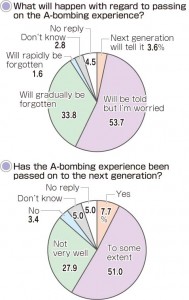Hiroshima Asks: Toward the 70th Anniversary of the Atomic Bombing: 90 percent of survivors worry that A-bombing experience will be forgotten
Jan. 13, 2015
Nationwide survey conducted by Chugoku Shimbun
Survivors hope their stories will be told, stress need for expanded education
by Mitsugu Sugimoto and Masakazu Domen, Staff Writers
A survey conducted by the Chugoku Shimbun in conjunction with this year’s 70th anniversary of the atomic bombing has found that about 90 percent of the survivors in Japan are worried that the atomic bombing experience will be forgotten. More than 70 percent of the respondents said they had made efforts to tell others of their experiences, and nearly 60 percent said they believe that the A-bombing experience has been passed on to a certain extent. But the survey highlighted the survivors’ serious concern about the near future, with most of them saying there was an urgent need for expanded peace education.
The survey was conducted from mid-September through mid-November of last year with the cooperation of groups throughout Japan that are affiliated with the Japan Confederation of A- and H-Bomb Sufferers Organizations (Nihon Hidankyo). Questionnaires were sent to 3,273 survivors, including 1,226 in Hiroshima Prefecture. Responses were received by mail from 1,526, nearly half of the total.
In response to a question about what would happen with regard to passing on the A-bombing experience, only 3.6 percent of the respondents said the next generation would pass it on so they were not concerned. The majority of the respondents, 53.7 percent, said they believed the A-bombing story would be told but they were worried that it might not be conveyed fully. One third said the A-bombing experience would gradually be forgotten, while 1.6 percent said it would rapidly be forgotten.
Most of the survivors, 74.4 percent, said they had made efforts to pass on their experiences. Of those, 70.0 percent said they had told their children and grandchildren about their experiences. Some said they had made a written account of their experiences, while other said they had recounted their stories at gatherings related to the A-bomb survivor or peace movements. Some said they had given talks at schools or spoken to students on field trips. (Multiple answers were allowed.)
As for whether or not the A-bombing experience has been passed on, a total of 58.7 percent said it had been or that it had been to some extent. As of the end of March 2014, the average of survivors who have an atomic bomb survivor’s certificate was 79.44 years, and the survey results indicated growing concern about the dwindling number of opportunities to hear accounts of the A-bombing experience directly as the survivors age.
With regard to efforts to pass on the A-bombing experience, the greatest number of respondents, 45.7 percent, said they hoped that peace education, including field trips to Hiroshima and Nagasaki, would be expanded. Many others said they hoped the A-bombing experience would be conveyed to the children and grandchildren of survivors or that the next generation would be trained to recount A-bombing stories and to serve as guides. (Multiple answers were allowed.)
(Originally published on January 1, 2015)







